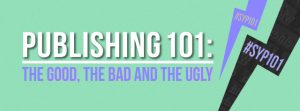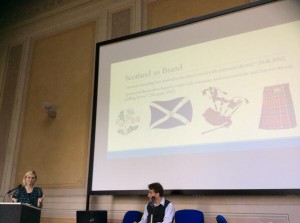
On Thursday the 4th December we enjoyed the last visiting speaker of the semester, Dr Sam Rayner, the Director of the Centre for Publishing at the University College of London (UCL). Dr Rayner’s talk focused on her paper ‘Star Texts: The Next Generation’ in which she explores the dynamic modern world of publishing and its impact and potential impact on teaching and learning in society. Dr Rayner analyses the way in which publishers edit and package content for new readers and new markets, the shaping of the literary canon, and the emergence and significance of several types of ‘Star Texts’. Before beginning her talk, Dr Rayner pre-warned us of her use of Star Trek puns (which she admitted she had toned down), however the class was eager to hear about her research on ‘Star Texts’.
But what does Dr Rayner mean by Star Texts?
Dr Rayner began by expressing that throughout her academic and professional life (whether it be teaching, research, working in libraries or bookselling), texts and their status and consumption have been fundamental. This made her interested in observing how we read, keep, study and rate books. As a literary and publishing researcher, Dr Rayner recognised that certain terms related to texts with cultural standing—‘The Canon’ and ‘The Classic’, have “become elusive and complicated by two other means of quality control”—‘The Prize Winners’ and ‘The Book Club Recommendations’. Dr Rayner collectively calls these four groups ‘Star Texts’, and argued, “these texts create clusters in the impossible constellation of the research environment that they belong to”. This term, ‘impossible constellation’ comes from Prof. Ruth Mateus-Berr from the University of Applied Art Vienna, during a conference on artistic research, and she used the term to attempt to describe the “several contradictory methods, understandings and histories” that could be applied to artistic research. Dr Rayner believes that this ‘constellation’ was a particularly useful way of understanding how texts exist in the 21st Century. Her research therefore focuses on the tension between a literary work, and the responses to the literary work in question. Dr Rayner suggested that whilst the text remains unchanged, there is a constant transformative process of the work, born out of the interaction and response from each specific reader.
‘The Classic’
Dr Rayner went on to discuss importance of the transformative star text group of ‘The Classic’. These texts, Dr Rayner argued, are those that most commonly stand the test of time. But what makes a text a ‘Classic’? Dr Rayner pointed out that scholars have very varied views on this question. The ‘Classic’, academics argue, should arguably be “timelessly appealing” and “elevate its author to the status of a god”. Dr Rayner also added that ‘Classics’ can be very subjective, and one individual’s list of ‘Classic’ texts won’t necessarily be the same as that of another individual. However, we do find a curated ‘Classics’ section in a bookshop, and publishers for centuries have created ‘Classic’ lists. This type of text is chosen, designed and marketed by publishers rather than academics (not suggesting they are purely commercial products, however). Dr Rayner asserted that the ‘Classic’ should appeal to every type of reader. She also pointed out that publishers such as Penguin attempt to modernise by means of packaging, engaging with digital, and marketing these timeless texts.
‘The Canon’
Dr Rayner next went on to explain another type of ‘Star Text’ known as ‘The Canon’. The establishment sets this group for primarily educational purposes and to define identities within culture. This type of text exists to represent the view of the individual and the preservation of tradition. Dr Rayner went on to discuss how texts have become ‘canonised’ in education through curriculum and have moved away from chronological presentation, towards a clear genre focused syllabi of texts. ‘The Canon’, Dr Rayner believes is undergoing a time of extreme change, and the impact of celebrity culture and national feeling are determining the way texts are canonised in education. Dr Rayner also addressed the issue of whether or not students should be given a prescribed reading list, as arguably this is a means of industrially restraining the individual’s imagination. Perhaps a more effective system would rather encourage young people to love reading and get into a habit of it, Dr Rayner shared to the argument.
‘Prize Winning Fiction’
The next type of ‘Star Text’ Dr Rayner explained was the ‘Prize Winning Fiction’ category. Dr Rayner argued that in the modern world of publishing, being nominated for literary prizes quite often means being read or not being read by the reading public. Dr Rayner also discussed how effective creative writing courses are in the emergence of this type of text and the development of a synergy between academics, creative writing and publishing bestsellers. The question was also raised over what should constitute as a ‘prize winner’. Should it be by measured by unit sales or by its literary quality? Furthermore, who should decide on these status elevated texts? Academics, publishers or readers?
‘The Book Club Recommendations’
Following on from Dr Rayner’s previous group of ‘Star Texts’ was the final group of ‘Book Club Recommendations’. This group can also be a prizewinner, but experiences the treatment of being associated with a well-known figure or celebrity. In these cases, the power of an individual’s brand is worth thousands in sales of a title if they have been selected as part of their ‘book club’. This phenomenon arguably gave the book back its ‘social history’ and within these book clubs, the well-known figure(s) (such as Oprah or Richard and Judy) play an active role in choosing, recommending and associating themselves with a title. Dr Rayner described how in a sense these individuals act as mediators between the author’s text and the audience. Book clubs show more than any other type of ‘Star Text’ the tension between the cultural and the commercial that exists in the book trade.
Merely ‘Solar Flares’ or Eternal ‘Burning Stars’?
Dr Rayner developed her argument by observing the conflict between cultural and academic responses of texts and the importance of reader interaction and marketing campaigns on the success of these titles. In the vast ‘constellation’ of texts in the current market, Dr Rayner believes that grouping these ‘Star Texts’ helps us to identify what drives us when we choose what we are reading. The development of technology also makes the text organic, with digital transforming the way in which we read, store and share text. Dr Rayner’s paper raised several interesting debates on the textual environment and what defines a text as a ‘Star’ and indeed what cultural, academic and commercial forces play a part. By the end of Dr Rayner’s talk, we were ready to “boldly go where no researchers have gone before” and explore the future of ‘Star Texts’ and textual constellations!
 The Internships Anonymous panel at the recent SYP Scotland’s Publishing 101 conference (3rd March 2017) provided some valuable insight into ‘the good, the bad and the ugly’ of publishing internships.
The Internships Anonymous panel at the recent SYP Scotland’s Publishing 101 conference (3rd March 2017) provided some valuable insight into ‘the good, the bad and the ugly’ of publishing internships.






